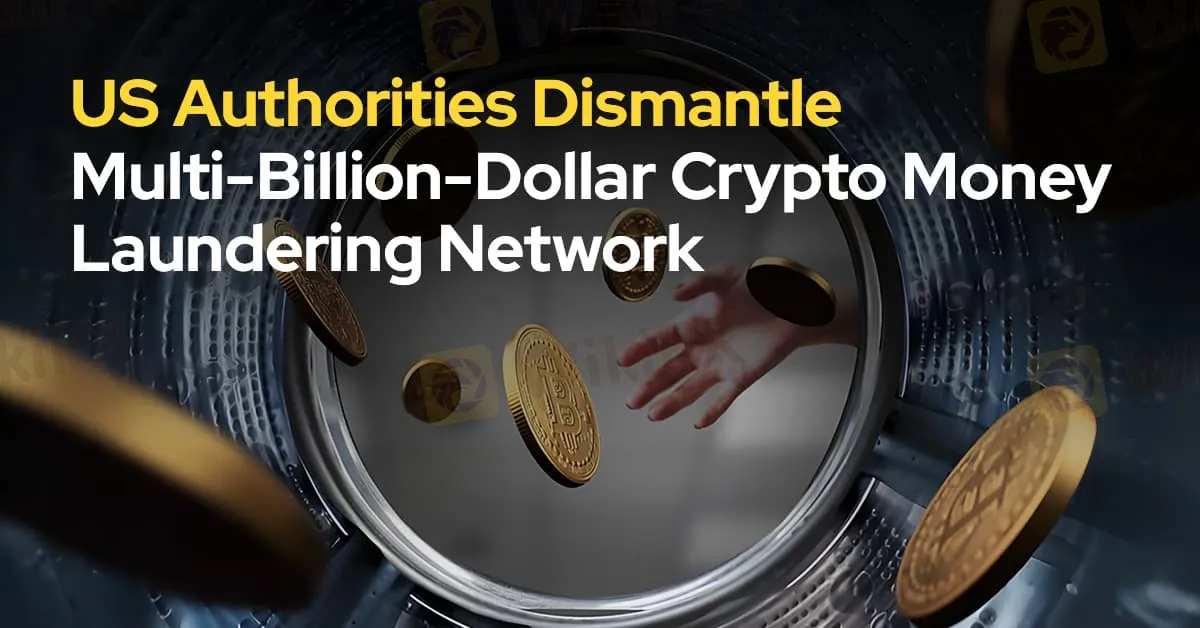简体中文
繁體中文
English
Pусский
日本語
ภาษาไทย
Tiếng Việt
Bahasa Indonesia
Español
हिन्दी
Filippiiniläinen
Français
Deutsch
Português
Türkçe
한국어
العربية
US Authorities Dismantle Multi-Billion-Dollar Crypto Money Laundering Network
Abstract:Two Russian individuals have been charged by the US government in connection with a multi-billion-dollar money laundering operation, part of a broader cybercriminal network.

Two individuals have been charged by the US government in connection with a multi-billion-dollar money laundering operation, part of a broader cybercriminal network. The US Department of Justice (DOJ), in collaboration with international law enforcement agencies, disrupted the operation and seized several websites linked to illegal cryptocurrency exchange activities.
According to the DOJ, the individuals, both of Russian nationality, were allegedly running cryptocurrency exchanges used primarily for laundering illicit funds. Their platforms catered to a wide range of cybercriminals, including ransomware operators, darknet drug traffickers, and fraudsters. The exchanges reportedly facilitated transactions involving stolen credit card data, ransomware profits, and other fraudulent gains.

One of the accused is believed to have laundered over $1.15 billion through cryptocurrency linked to various criminal activities. The investigation revealed that 32% of the bitcoins traced back to the individual came from illegal sources, including ransomware payments and darknet markets. Additionally, the operation was tied to a major security breach in 2013, which targeted a US retailer and resulted in damages exceeding $202 million.
US Attorney Jessica Aber, for the Eastern District of Virginia, highlighted the relentless pursuit of cybercriminals, stating that “every step cybercriminals take in their pursuit of money leaves another track that leads us to their doorstep.” She emphasized that no matter the layers of anonymity offered by these platforms, law enforcement would continue to dismantle such operations.
One of the cryptocurrency exchanges involved, Cryptex.net, was designed to provide complete anonymity to its users, making it a popular platform for cybercriminals seeking to evade know-your-customer (KYC) regulations. Blockchain analysis revealed that 31% of the $1.4 billion transacted through Cryptex was linked to illegal sources, including ransomware and fraud. The DOJ, working with foreign partners, seized domain names connected to Cryptex, effectively shutting down the platform.
As part of the international effort, Dutch authorities seized servers associated with the Cryptex exchange and confiscated approximately $7 million in cryptocurrency. Other agencies involved in the takedown included law enforcement bodies from Germany, Latvia, the United Kingdom, and Europol.
To further pursue the accused, the US State Department has announced rewards of up to $11 million for information leading to their arrest. In addition, the US Treasury Department's Financial Crimes Enforcement Network (FinCEN) designated one of the platforms, PM2BTC, as a “primary money laundering concern” and imposed sanctions on both Cryptex and the individuals involved in the scheme.
This joint operation marks a significant step in combating global cybercriminal networks and the use of cryptocurrencies in laundering illicit funds.

Disclaimer:
The views in this article only represent the author's personal views, and do not constitute investment advice on this platform. This platform does not guarantee the accuracy, completeness and timeliness of the information in the article, and will not be liable for any loss caused by the use of or reliance on the information in the article.
Read more

U.S. Seizes $225M in Crypto Tied to Massive Scam Operation
U.S. authorities seized $225 million in crypto tied to large-scale scams, aiming to return funds to victims of crypto trading fraud.

Global Stablecoin Regulation Enters New Phase as U.S. Senate Approves Landmark Bill
The U.S. Senate has passed the GENIUS Act, a historic move to regulate stablecoins pegged to the U.S. dollar. As the world’s major economies race to define legal frameworks for digital currencies, this vote marks a pivotal moment—one that echoes Europe’s MiCA rules and mirrors regulatory shifts in Asia.

Philippines Sets Southeast Asia’s First Crypto Regulatory Framework
Philippines launches pioneering crypto regulations, enhancing investor protection and market transparency with strict rules for CASPs.

Tether Freezes $12.3 Million in USDT Over Money Laundering Concerns
Tether freezes $12.3 million in USDT on Tron blockchain, reinforcing its anti-money laundering efforts and compliance with U.S. Treasury sanctions.
WikiFX Broker
Latest News
HYCM Broker Review 2025: A Comprehensive Overview
WikiFX’s Complimentary Protection Services Aim to Safeguard Investors' Legal Rights and Interests
Exness Acquires €75 Million Property in Cyprus for Future Growth
CMCMarkets vs J.P. Morgan: Which One is Suitable for You?
Broker Review: EightCap VS iFOREX ! Which Trading Platform Should You Choose?
TradeHall vs. HYCM: Which Broker Should You Choose?
Is SDStarFX a Legal Broker? Read This to Find Out
Is Your Money Safe with Libra Markets? Check Out Fast!
FCA Issues New Warnings Against Clone and Unauthorised Firms
Important Statement on the Authenticity of WikiFX Score and Broker Reviews
Currency Calculator


